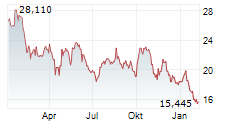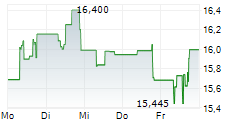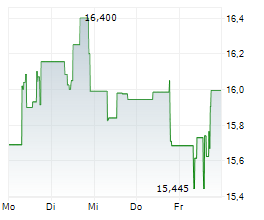
- Based on DESTINY-Breast06 phase 3 trial results which showed ENHERTU demonstrated superiority versus chemotherapy with a median progression-free survival of more than one year
- Approval brings Daiichi Sankyo and AstraZeneca's ENHERTU earlier in the treatment of HR positive, HER2 low breast cancer and broadens the eligible patient population to those with HER2 ultralow disease
Daiichi Sankyo (TSE: 4568) and AstraZeneca's (LSE/STO/Nasdaq: AZN) ENHERTU (trastuzumab deruxtecan) has been approved in the European Union (EU) as a monotherapy for the treatment of adult patients with unresectable or metastatic hormone receptor (HR) positive, HER2 low (IHC 1+ or IHC 2+/ISH-) or HER2 ultralow (IHC 0 with membrane staining) breast cancer who have received at least one endocrine therapy in the metastatic setting and who are not considered suitable for endocrine therapy as the next line of treatment.
ENHERTU is a specifically engineered HER2 directed DXd antibody drug conjugate (ADC) discovered by Daiichi Sankyo and being jointly developed and commercialized by Daiichi Sankyo and AstraZeneca.
The approval by the European Commission follows the positive opinion of the Committee for Medicinal Products for Human Use of the European Medicines Agency and is based on results from the DESTINY-Breast06 phase 3 trial presented at the 2024 American Society of Clinical Oncology (ASCO24) Annual Meeting and published in The New England Journal of Medicine
HR positive, HER2 negative is the most common breast cancer subtype, accounting for approximately 70% of all breast cancers.1 Despite being classified as HER2 negative, many of these tumors still have some level of HER2 expression. Currently, regardless of HER2 expression, endocrine-based therapies are widely used in the early lines of treatment for HR positive metastatic breast cancer. Following endocrine-based therapy, some patients discontinue treatment, and others are treated with conventional chemotherapy which is associated with poor response rates and outcomes.2,3,4,5
"This approval introduces a new treatment option for HR positive metastatic breast cancers that express HER2," said Giuseppe Curigliano, MD, PhD, Professor of Medical Oncology at the University of Milan and the Head of the Division of Early Drug Development at the European Institute of Oncology, IRCCS, Italy and Principal Investigator of DESTINY-Breast06. "In DESTINY-Breast06, ENHERTU outperformed chemotherapy, providing progression-free survival of more than one year for patients with HR positive, HER2 low or HER2 ultralow metastatic breast cancer, demonstrating the benefit of treating these patients with ENHERTU instead of chemotherapy."
In the DESTINY-Breast06 trial, ENHERTU demonstrated a 38% reduction in the risk of disease progression or death versus chemotherapy in patients with chemotherapy-naïve HR positive, HER2 low metastatic breast cancer (n=713; hazard ratio [HR] 0.62; 95% confidence interval [CI]: 0.52-0.75; p<0.0001) as assessed by blinded independent review (BICR). Median progression-free survival (PFS) was 13.2 months (95% CI: 11.4-15.2) in the ENHERTU arm compared to 8.1 months (95% CI: 7.0-9.0) in the chemotherapy arm.
The confirmed objective response rate (ORR) in the HER2 low population was 56.5% (95% CI: 51.2-61.7) in the ENHERTU arm versus 32.2% (95% CI: 27.4-37.3) in the chemotherapy arm. Median duration of response (DOR) was 14.1 months (95% CI: 11.8-15.9) in the ENHERTU arm versus 8.6 months (95% CI: 6.7-11.3) in the chemotherapy arm.
In the overall trial population of patients with chemotherapy-naïve HR positive, HER2 low or HER2 ultralow metastatic breast cancer (n=866), ENHERTU achieved a similar 36% reduction in the risk of disease progression or death versus chemotherapy (HR 0.64; 95% CI: 0.54-0.76; p<0.0001). A median PFS of 13.2 months (95% CI: 12.0-15.2) was seen in patients treated with ENHERTU compared to 8.1 months (95% CI: 7.0-9.0) in patients treated with chemotherapy.
Confirmed ORR in the overall trial population was 57.3% (95% CI: 52.5-62.0) in the ENHERTU arm versus 31.2% (95% CI: 26.8-35.8) in the chemotherapy arm. Median DOR was 14.3 months (95% CI: 12.5-15.9) in the ENHERTU arm versus 8.6 months (95% CI: 6.9-11.5) in the chemotherapy arm.
An exploratory analysis of the HER2 ultralow population (n=152; HR 0.78; 95% CI: 0.50-1.21) showed the clinically meaningful improvement in PFS was consistent between patients with HER2 low and HER2 ultralow expression, with 13.2 months (95% CI: 9.8-17.3) in patients treated with ENHERTU compared to 8.3 months (95% CI: 5.8-15.2) in those treated with chemotherapy. Confirmed ORR was 61.8% (95% CI: 50.0-72.8) in the ENHERTU arm versus 26.3% (95% CI: 16.9-37.7) in the chemotherapy arm. Median DOR was 14.3 months (95% CI: 9.2-20.7) in the ENHERTU arm versus 14.1 months (95% CI: 5.9, not estimable) in the chemotherapy arm.
"ENHERTU continues to evolve what is possible with breast cancer treatment, becoming the first HER2 directed medicine approved in the EU for patients with HR positive metastatic breast cancer with HER2 low or HER2 ultralow expression following endocrine therapy," said Ken Keller, Global Head of Oncology Business, and President and CEO, Daiichi Sankyo, Inc. "Today's approval expands the use of ENHERTU to now include an earlier treatment setting of HER2 low metastatic breast cancer and broadens the patient population eligible for treatment to those with HER2 ultralow disease."
"ENHERTU continues to open up new approaches to the diagnosis and treatment of patients with metastatic breast cancer," said Dave Fredrickson, Executive Vice President, Oncology Hematology Business Unit, AstraZeneca. "This approval underscores the importance of testing metastatic breast cancer tumors for any IHC staining to identify patients with HR positive, HER2 low or HER2 ultralow disease who may be eligible for ENHERTU once sustained responses are no longer achieved with endocrine-based therapy."
In DESTINY-Breast06, the safety profile of ENHERTU was consistent with previous clinical trials with no new safety concerns identified. Grade 3 or grade 4 treatment-related adverse events from a pooled safety analysis of patients treated with ENHERTU (5.4 mg/kg) across multiple tumor types in clinical studies included neutropenia (18.0%), anemia (10.5%), fatigue (7.8%), leukopenia (6.0%), thrombocytopenia (5.4%), nausea (4.9%), lymphopenia (3.9%), hypokalemia (3.8%), transaminases increased (3.5%), diarrhea (2.5%), vomiting (2.4%), decreased appetite (1.8%), pneumonia (1.3%), and ejection fraction decreased (1.0%). Grade 5 adverse reactions occurred in 1.4% of patients, including interstitial lung disease (1.1%).
ENHERTU is already approved in more than 75 countries, including the EU, for patients with HER2 low metastatic breast cancer who have received a prior systemic therapy in the metastatic setting or developed disease recurrence during or within six months of completing adjuvant chemotherapy based on the results from the DESTINY-Breast04 trial.
Financial Considerations
Following this approval in the EU, an amount of $125 million is due from AstraZeneca to Daiichi Sankyo as a milestone payment for the HER2 low and HER2 ultralow chemotherapy-naive breast cancer indication. Sales of ENHERTU in most EU territories are recognized by Daiichi Sankyo. For further details on the financial arrangements, please consult the collaboration agreement from March 2019.
About DESTINY-Breast06
DESTINY-Breast06 is a global, randomized, open-label, phase 3 trial evaluating the efficacy and safety of ENHERTU (5.4 mg/kg) versus investigator's choice of chemotherapy (capecitabine, paclitaxel or nab paclitaxel) in patients with HR positive, HER2 low (IHC 1+ or IHC 2+/ISH-) or HER2 ultralow (defined as IHC 0 with membrane staining) advanced or metastatic breast cancer. Patients in the trial had no prior chemotherapy for advanced or metastatic disease and received at least two lines of prior endocrine therapy in the metastatic setting. Patients also were eligible if they had received one prior line of endocrine therapy combined with a CDK4/6 inhibitor in the metastatic setting and experienced disease progression within six months of starting first-line treatment or received endocrine therapy as an adjuvant treatment and experienced disease recurrence within 24 months.
HER2 IHC status was confirmed by a central laboratory and determined based on the most recent evaluable HER2 IHC sample prior to randomization. In tumor samples from patients screened for trial eligibility, nearly two-thirds of tumors previously assessed as IHC 0 at a local laboratory were re-classified as HER2 low or HER2 ultralow upon central analysis of the archival tumor sample. It was also observed that approximately 85% to 90% of patients with HR positive, HER2 negative metastatic breast cancer may have actionable levels of HER2 expression.
The primary endpoint of DESTINY-Breast06 is PFS in the HR positive, HER2 low patient population as measured by BICR. Key secondary endpoints include PFS by BICR in the overall trial population (HER2 low and HER2 ultralow), OS in patients in the HER2 low patient population and OS in the overall trial population. Other secondary endpoints include ORR, DOR, time to first subsequent treatment or death, time to second subsequent treatment or death and safety. Analysis of the HER2 ultralow subgroup was not powered to demonstrate statistical significance.
DESTINY-Breast06 enrolled 866 patients (n=713 for HER2 low and n=152 for HER2 ultralow) in Asia, Europe, North America, Oceania and South America. For more information about the trial, visit ClinicalTrials.gov
About Breast Cancer and HER2 Expression
Breast cancer is the second most common cancer and one of the leading causes of cancer-related deaths worldwide.6 More than two million breast cancer cases were diagnosed in 2022, with more than 665,000 deaths globally.6 In Europe, approximately 557,000 cases of breast cancer are diagnosed annually.7 While survival rates are high for those diagnosed with early breast cancer, only about 30% of patients diagnosed with or who progress to metastatic disease are expected to live five years following diagnosis.1
HR positive, HER2 negative is the most common breast cancer subtype, accounting for approximately 70% of all breast cancers.1 HER2 is a tyrosine kinase receptor growth-promoting protein expressed on the surface of many types of tumors, including breast cancer.8 Patients with high levels of HER2 expression (IHC 3+ or IHC 2+/ISH+) are classified as HER2 positive and treated with HER2 targeted therapies, representing approximately 15% to 20% of all breast cancers.9 Historically, tumors that were not classified as HER2 positive were classified as HER2 negative, despite the fact that many of these tumors still carry some level of HER2 expression.10
Endocrine therapy is widely given consecutively in the early lines of treatment for HR positive metastatic breast cancer. However, after initial therapy, further efficacy with additional endocrine treatment is often limited.2 Prior to the approval of ENHERTU in HER2 low and HER2 ultralow metastatic breast cancer based on the DESTINY-Breast04 and DESTINY-Breast06 trials, there were no HER2 targeted therapies approved specifically for these patient populations.11,12
About ENHERTU
ENHERTU (trastuzumab deruxtecan; fam-trastuzumab deruxtecan-nxki in the U.S. only) is a HER2 directed ADC. Designed using Daiichi Sankyo's proprietary DXd ADC Technology, ENHERTU is the lead ADC in the oncology portfolio of Daiichi Sankyo and the most advanced program in AstraZeneca's ADC scientific platform. ENHERTU consists of a HER2 monoclonal antibody attached to a number of topoisomerase I inhibitor payloads (an exatecan derivative, DXd) via tetrapeptide-based cleavable linkers.
ENHERTU (5.4 mg/kg) is approved in more than 75 countries worldwide for the treatment of adult patients with unresectable or metastatic HER2 positive (immunohistochemistry [IHC] 3+ or in-situ hybridization (ISH)+) breast cancer who have received a prior anti-HER2-based regimen, either in the metastatic setting or in the neoadjuvant or adjuvant setting, and have developed disease recurrence during or within six months of completing therapy based on the results from the DESTINY-Breast03 trial.
ENHERTU (5.4 mg/kg) is approved in more than 75 countries worldwide for the treatment of adult patients with unresectable or metastatic HER2 low (IHC 1+ or IHC 2+/ISH-) breast cancer who have received a prior systemic therapy in the metastatic setting or developed disease recurrence during or within six months of completing adjuvant chemotherapy based on the results from the DESTINY-Breast04 trial.
ENHERTU (5.4 mg/kg) is approved in more than 30 countries for the treatment of adult patients with unresectable or metastatic hormone receptor (HR) positive, HER2 low (IHC 1+ or IHC 2+/ISH-) or HER2 ultralow (IHC 0 with membrane staining) breast cancer, as determined by a locally or regionally approved test, that has progressed on one or more endocrine therapies in the metastatic setting based on the results from the DESTINY-Breast06 trial.
ENHERTU (5.4 mg/kg) is approved in more than 50 countries worldwide for the treatment of adult patients with unresectable or metastatic NSCLC whose tumors have activating HER2 (ERBB2) mutations, as detected by a locally or regionally approved test, and who have received a prior systemic therapy based on the results from the DESTINY-Lung02 and/or DESTINY-Lung05 trials. Continued approval in China and the U.S. for this indication may be contingent upon verification and description of clinical benefit in a confirmatory trial.
ENHERTU (6.4 mg/kg) is approved in more than 65 countries worldwide for the treatment of adult patients with locally advanced or metastatic HER2 positive (IHC 3+ or IHC 2+/ISH+) gastric or gastroesophageal junction (GEJ) adenocarcinoma who have received a prior trastuzumab-based regimen based on the results from the DESTINY-Gastric01, DESTINY-Gastric02 and/or DESTINY-Gastric06 trials. Continued approval in China for this indication may be contingent upon verification and description of clinical benefit in a confirmatory trial.
ENHERTU (5.4 mg/kg) is approved in Brazil, Israel, Russia and the U.S. for the treatment of adult patients with unresectable or metastatic HER2 positive (IHC 3+) solid tumors who have received prior systemic treatment and have no satisfactory alternative treatment options based on efficacy results from the DESTINY-PanTumor02, DESTINY-Lung01 and DESTINY-CRC02 trials. Continued approval for this indication may be contingent upon verification and description of clinical benefit in a confirmatory trial.
About the ENHERTU Clinical Development Program
A comprehensive global clinical development program is underway evaluating the efficacy and safety of ENHERTU monotherapy across multiple HER2 targetable cancers. Trials in combination with other anticancer treatments, such as immunotherapy, also are underway.
About the Daiichi Sankyo and AstraZeneca Collaboration
Daiichi Sankyo and AstraZeneca entered into a global collaboration to jointly develop and commercialize ENHERTU in March 2019 and DATROWAY in July 2020, except in Japan where Daiichi Sankyo maintains exclusive rights for each ADC. Daiichi Sankyo is responsible for the manufacturing and supply of ENHERTU and DATROWAY.
About the ADC Portfolio of Daiichi Sankyo
The Daiichi Sankyo ADC portfolio consists of seven ADCs in clinical development crafted from two distinct ADC technology platforms discovered in-house by Daiichi Sankyo.
The ADC platform furthest in clinical development is Daiichi Sankyo's DXd ADC Technology where each ADC consists of a monoclonal antibody attached to a number of topoisomerase I inhibitor payloads (an exatecan derivative, DXd) via tetrapeptide-based cleavable linkers. The DXd ADC portfolio currently consists of ENHERTU, a HER2 directed ADC, and DATROWAY, a TROP2 directed ADC, which are being jointly developed and commercialized globally with AstraZeneca. Patritumab deruxtecan (HER3-DXd), a HER3 directed ADC, ifinatamab deruxtecan (I-DXd), a B7-H3 directed ADC, and raludotatug deruxtecan (R-DXd), a CDH6 directed ADC, are being jointly developed and commercialized globally with Merck Co., Inc, Rahway, NJ, USA. DS-3939, a TA-MUC1 directed ADC, is being developed by Daiichi Sankyo.
The second Daiichi Sankyo ADC platform consists of a monoclonal antibody attached to a modified pyrrolobenzodiazepine (PBD) payload. DS-9606, a CLDN6 directed PBD ADC, is the first of several planned ADCs in clinical development utilizing this platform.
Ifinatamab deruxtecan, patritumab deruxtecan, raludotatug deruxtecan, DS-3939 and DS-9606 are investigational medicines that have not been approved for any indication in any country. Safety and efficacy have not been established.
About Daiichi Sankyo
Daiichi Sankyo is an innovative global healthcare company contributing to the sustainable development of society that discovers, develops and delivers new standards of care to enrich the quality of life around the world. With more than 120 years of experience, Daiichi Sankyo leverages its world-class science and technology to create new modalities and innovative medicines for people with cancer, cardiovascular and other diseases with high unmet medical need. For more information, please visit www.daiichisankyo.com.
References
1 National Cancer Institute. SEER Cancer Stat Facts: Female Breast Cancer Subtypes Accessed April 2025.
2 Manohar P, et al. Cancer Biol Med. 2022 Feb 15; 19(2):202-212.
3 Cortes J, et al. Lancet. 2011;377:914-923.
4 Yuan P, et al. Eur J Cancer. 2019;112:57-65.
5 Jerusalem G, et al. JAMA Oncol. 2018;4(10):1367-1374.
6 Bray F, et al. CA Cancer J. Clin. 2024; 10.3322/caac.21834.
7 Globocan 2022. Breast Cancer. Accessed April 2025.
8 Iqbal N, et al. Mol Biol Int 2014;852748.
9 Ahn S, et al. J Pathol Transl Med. 2020;54(1):34-44.
10 Sajjadi E, et al. Cancer Drug Resist. 2022;5(4):882-888.
11 Modi S, et al. N Engl J Med2022;387:9-20.
12 Eiger D, et al. Cancers 2021 Mar; 13(5): 1015.
View source version on businesswire.com: https://www.businesswire.com/news/home/20250403813366/en/
Contacts:
Media Contacts:
Global:
Jennifer Brennan
Daiichi Sankyo, Inc.
jennifer.brennan@daiichisankyo.com
+1 908 900 3183 (mobile)
EU:
Simone Jendsch-Dowé
Daiichi Sankyo Europe GmbH
simone.jendsch-dowe@daiichisankyo.com
+49 (89) 78080 (office)
Japan:
Daiichi Sankyo Co., Ltd.
DS-PR_jp@daiichisankyo.com
Investor Relations Contact:
DaiichiSankyoIR_jp@daiichisankyo.com.




